
Iran’s foreign ministry spokesman said that efforts by “all parties” to revive the country’s 2015 nuclear agreement with world powers had resulted in “good progress” during talks in Vienna.
Negotiations to salvage the nuclear deal resumed in late November after they were suspended in June as Iran elected a new, ultraconservative government.
The 2015 deal, agreed by Iran, the U.S., China, Russia, Britain, France and Germany, offered Tehran sanctions relief in exchange for curbs on its nuclear program.
But then-president Donald Trump unilaterally withdrew the U.S. in 2018 and reimposed biting sanctions, prompting Tehran to begin rolling back on its commitments.
“There has been good progress on all four issues of removing sanctions, nuclear issues, verification and obtaining guarantees” during the latest round of talks, Iran’s foreign ministry spokesman Saeed Khatibzadeh told reporters on Jan. 10.
This progress is “the result of the efforts made by all parties to reach a stable agreement.”
His comments are the latest in a series of positive announcements by Iran on the talks, as the Islamic republic negotiates with the remaining parties to the deal.
The U.S. has participated only indirectly in the Vienna talks, which seek to bring Washington back inside the accord and to ensure Iran re-adheres to its own commitments.
“We are seeking a reliable and stable deal,” Khatibzadeh said.
“If the other party thinks an unstable and unreliable agreement is to their benefit, this is not what the Islamic Republic is after,” he added.
French Foreign Minister Jean-Yves Le Drian said on Jan. 7 that negotiations were progressing on a “rather positive path” but emphasised the urgency of bringing them to a speedy conclusion.
Iran’s foreign minister Hossein Amir-Abdollahian on Jan. 9 said that the two sides are nearing a “good agreement.”
This was due to France “behaving reasonably” after previously playing “the role of a bad cop”, and the U.S. adapting to “realities.”
But Amir-Abdollahian cautioned that reaching a renewed agreement quickly remains dependent on the other parties.
Britain, France and Germany said last month that the window for concluding a deal was “weeks, not months,” due to the speed of Iran’s nuclear enrichment.
Meanwhile, Israeli Prime Minister Naftali Bennett said that his country will not be bound by any nuclear deal with Iran and will continue to consider itself free to act against its nemesis if necessary.